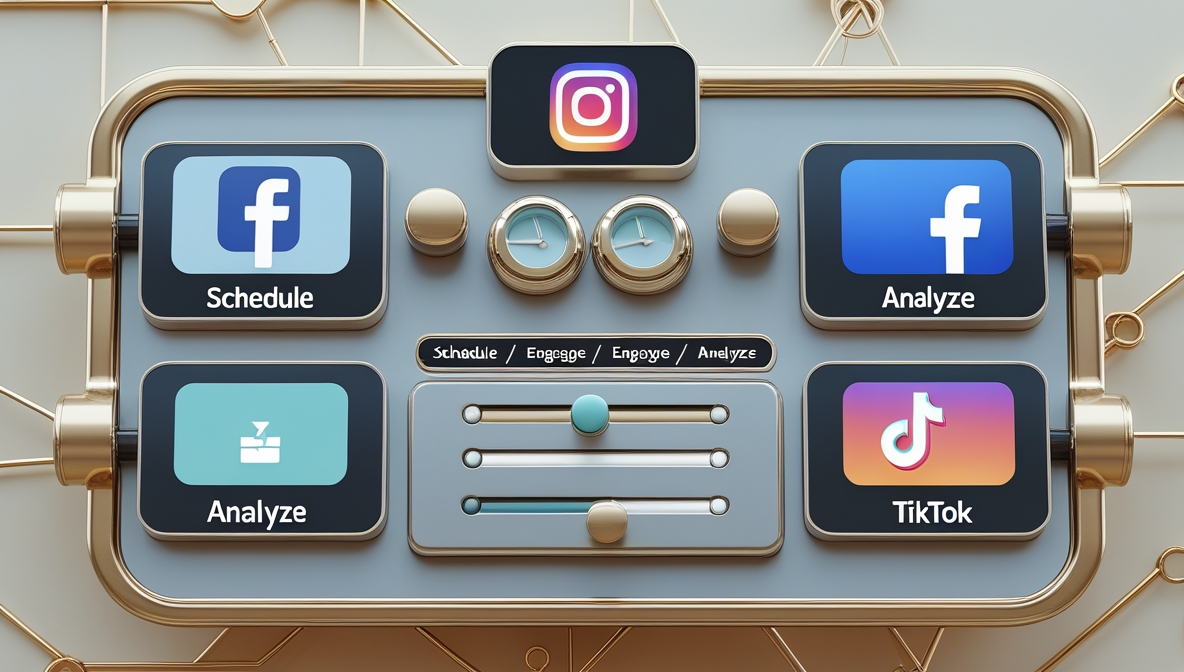In today’s digital-first marketplace, social media is a cornerstone of brand visibility, customer engagement, and online growth. Yet managing multiple platforms, crafting timely content, and analyzing performance manually is not only time-consuming but inefficient. That’s where social media management tools come into play — empowering businesses to streamline workflows, increase productivity, and achieve superior marketing outcomes.
What is a Social Media Management Tool?
A social media management tool is a centralized platform that allows users to create, schedule, manage, and analyze content across various social media channels such as Facebook, Instagram, Twitter (X), LinkedIn, TikTok, and Pinterest. These tools offer a unified dashboard for team collaboration, post automation, monitoring audience engagement, and generating in-depth analytics.
Boosting Productivity with Streamlined Workflows
One of the primary advantages of using a social media management tool is its ability to simplify complex workflows. Rather than toggling between different apps or platforms, users can:
-
Schedule posts in advance, ensuring consistent presence even during holidays or off-hours.
-
Use content calendars to visualize and plan campaigns weeks or months ahead.
-
Assign roles and permissions, which is essential for collaborative teams.
-
Create drafts, queue content, and automate approval processes for enhanced editorial control.
With these features, marketing teams save countless hours while maintaining a strategic, consistent brand presence.
Unified Multi-Platform Publishing
Publishing content on multiple platforms can be tedious. A social media management platform allows businesses to:
-
Publish to several channels simultaneously with just one click.
-
Customize messages for each platform while maintaining the core message.
-
Optimize posting times based on when audiences are most active.
This ensures maximum reach without duplicating effort. It also reduces the risk of forgetting to post or making errors in rushed manual uploads.
Advanced Analytics and Reporting
Data is the key to continuous improvement in digital marketing. Social media management tools provide detailed analytics dashboards that track:
-
Engagement metrics like likes, shares, comments, and saves.
-
Audience demographics including age, gender, location, and device usage.
-
Post-performance insights, highlighting which content resonates best.
-
ROI and conversion metrics, which link social activity to business outcomes.
These insights allow marketers to refine their strategy, optimize content, and justify budget allocations with confidence.
Enhanced Audience Engagement and Monitoring
Social media is more than just broadcasting; it’s a two-way street. These tools include real-time monitoring features such as:
-
Comment tracking across all platforms.
-
Keyword and hashtag alerts to follow brand mentions.
-
Inbox unification, making it easier to respond to DMs, comments, and reviews.
With centralized communication tools, businesses can respond faster, build stronger relationships, and manage their online reputation more effectively.
Time and Cost Efficiency
Hiring a large team to manually manage each social platform isn’t feasible for most businesses. With the automation and centralization offered by social media tools, companies can:
-
Cut down on labor costs by eliminating redundant tasks.
-
Reduce the need for additional software like separate analytics or design tools.
-
Free up creative and strategic resources by automating repetitive work.
Over time, this results in significant cost savings and improved return on investment.
Improved Content Strategy with Insights and Trends
Effective content marketing requires data-backed decisions. Many social media tools incorporate trend analysis, competitor benchmarking, and content suggestion features. These insights help marketers:
-
Identify trending topics and leverage them for real-time marketing.
-
Analyze competitor strategies and fill content gaps.
-
Optimize content type, format, and frequency based on engagement patterns.
This elevates a brand’s ability to stay relevant, engaging, and aligned with audience interests.
Team Collaboration and Role Management
Larger teams benefit immensely from workflow transparency and accountability features within these tools. Team collaboration tools allow:
-
Task assignment and role-based permissions.
-
Internal notes and content approvals within the platform.
-
Activity logs for auditing and performance evaluation.
These features are especially valuable in agencies, marketing departments, and enterprises, ensuring seamless collaboration and quality control.
Cross-Functional Integration with Marketing Tools
Leading social media management platforms integrate seamlessly with CRM systems, email marketing platforms, analytics tools, and design software. This means:
-
Cross-channel campaign management becomes easier.
-
Teams can track leads from social posts through the sales funnel.
-
Design and branding remain consistent across platforms via integration with tools like Canva, Adobe Suite, or Google Drive.
These integrations eliminate silos and create a connected marketing ecosystem that boosts efficiency and results.
Scheduling and Automation for 24/7 Engagement
Consumers expect brands to be active and responsive round-the-clock. Social media tools offer intelligent automation, including:
-
Post scheduling based on peak engagement times.
-
Auto-responses for FAQs or support requests.
-
Recurring posts for evergreen content.
These features help brands maintain a vibrant presence without requiring someone to be online at all times.
Crisis Management and Brand Protection
Brand reputation can be impacted in seconds on social media. These tools help businesses monitor mentions in real-time, allowing:
-
Immediate alerts for negative sentiment or trending hashtags.
-
Rapid response workflows to manage PR crises effectively.
-
Archive and logging features to document events for internal analysis.
Being proactive in crisis situations protects brand integrity and ensures a swift, coordinated response.
Conclusion: Unlocking the Power of Social Media with the Right Tools
Investing in a social media management tool is not a luxury—it’s a necessity for any brand that wants to remain competitive, efficient, and strategic. These platforms offer powerful features that enhance productivity, unify communication, and drive measurable results across the entire digital ecosystem.
Whether you're a small business aiming to scale your online presence or a global brand orchestrating complex campaigns, a robust social media management solution is your gateway to streamlined success.




